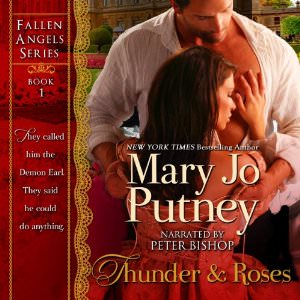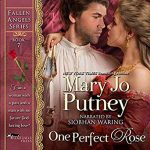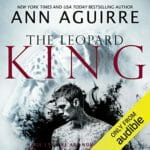Thunder and Roses (along with most of the older Mary Jo Putney books) is on my keeper shelf. It’s been years since I read it and the many books which intervened meant I remembered little of the plot other than that I had enjoyed it. The print version was first published in 1993 and I think it shows. That said, I had fun revisiting the story even with a lacklustre narrating performance from Peter Bishop.
Nicolas Davies, the Earl of Aberdare, is known to the local Welsh people as “the Demon Earl” or “the Gypsy Earl” (to many people in the area, demon and gypsy are kind of synonymous – something which apparently holds true today, sadly). His father ran off and married Marta, a Romany woman. In the prologue, Marta brought Nicolas to Aberdare and (apparently) sold him to his grandfather, the Earl, for 100 guineas. Nicholas was seven years old and never saw his mother again.
Fast-forward approximately 23 years and Nicolas has returned to Aberdare after a four-year absence. The rumours are that he was sleeping with the old Earl’s young second wife and upon discovering the affair, the old Earl had an apoplexy and died. Nicolas’s own wife, fearing for her life, escaped and was killed that very night in a carriage accident. Or so the story goes.
Clare Morgan is the local schoolmistress and the daughter of a Methodist preacher. She approaches Nicolas to beg him to intervene in the town’s economy and in particular in relation to safety at the local coal mine. The mine is on Aberdare land but is leased to Sir Michael Kenyon, a good friend of Nicolas’s. Nicolas is not inclined to help and, in an attempt to drive Clare away, offers her a bargain. She is to stay under his roof for three months and offer herself up for a daily kiss (at a “time and in a place” of his choosing – and the place part has a double meaning by the way). She will thus lose her reputation but in return he will do all he can to improve the lot of the townsfolk.
The set up takes some getting over because it’s pretty ridiculous. However, having the pair under the same roof does mean that there is a lot of hero/heroine activity and the daily kiss means that the sexytimes (of a sort) start from day one.
The rest of the story is taken up with the developing relationship between Nicholas and Clare, the puzzling and apparently sudden enmity of Michael Kenyon toward Nicolas, and the project of economic improvement for the people of Aberdare. On the way, there are penguins, a duel fought with whips, a game of strip billiards and a religious awakening via the mighty wang of lovin’ (truly). In the end all of the secrets are revealed – including an answer to the mystery of what really happened the night the old Earl died.
The Welsh setting was different than your run-of-the-mill Regency fare. But what makes this book really interesting is the detail about the coal mining process – both the old ways and the newer, steam-powered methods. The coal mining aspects were fascinating and had the ring of authenticity. Also intriguing was the information about the Rom. The narrative did serve to dispel some of the unfair and incorrect stereotyping of the Romany people – including information about their ingrained modesty and their culture, but didn’t go quite far enough in my opinion. There did seem to be an acceptance that gypsies are thieves. I went down a bit of a rabbit-hole today Googling gypsies and the truth is that Romany people are no more or less likely to be thieves than the rest of us.
While I acknowledge there are many facets of the story that strain credulity and that are on the cheesy side, I did enjoy revisiting the book. I was disappointed in the narration however. Peter Bishop is no Nicholas Boulton. He was okay – mostly. He seemed to read the story rather than perform it. I did a bit of a search on Audible and it seems he has narrated 15 prior books, none of which were romance. Perhaps that explains the curious flatness I heard in his intonation much of the time.
That’s not to say there was no expression at all in his reading. Rather, what there was was understated in the extreme, and regularly, the emotion did not match the text. Earnest conversation was sometimes delivered as if it were a children’s story.
There was a slight softening of his tones for the female characters, but the degree was very slight indeed and most of the time, Clare sounded exactly like Nicolas. Also disappointing was that there was no or little attempt at any accents. Clare is Welsh. Owen is Welsh. Magrid is Welsh. But they sounded like they were from London. Possibly from the same middle class London street.
I didn’t feel Mr. Bishop added anything in terms of characterisation. The story rose and fell on the text, not the narrative performance. It wasn’t an unbearable or terribly annoying narration. It was just… forgettable and bland.
Oh well, I guess Nicholas Boulton can’t narrate all the books.
Kaetrin
Narration: C-
Book Content: B-
Steam Factor: Glad I had my earbuds in
Violence: Fighting
Genre: Historical Romance
Publisher: Mary Jo Putney Inc.
Thunder and Roses was provided to AudioGals by the author for review.





He seemed to read the story rather than perform it.
This is EXACTLY the same thing I said about the narrator of Dancing on the Wind. It’s not a performance at all, he’s just reading the words.
Perhaps this is Ms Putney’s preference – although personally, I can’t understand it.
Strangely enough, I saw a comment recently over at (I think) the Goodreads group where someone actually expressed a preference for this type of reading as it meant they (the commenter) would still be able to make their own mind up about the characters, as too much expression got in the way.
Er… what? If that’s all you want, you might as well just turn on the speech function on your ereader, or listen to a robot.
Ms Putney – if you read any of these comments, please, PLEASE listen to Nick Boulton, Rosalyn Landor, Carolyn Morris, James Langton (to name but a few) – any one of whom would actually bring your books to life rather than killing them stone dead.
Yes, it’s such a disappointment.
I have a friend who doesn’t like character voices at all – there really are some people who honestly enjoy a story just being read. I’m not one of them, but it’s horses for courses I guess.
But even when a complete amateur such as myself reads books aloud (to kids in school, or to my own when they were younger), I do the voices!
I can understand that there are people who don’t like listening to audiobooks. But why would you want to listen to one that doesn’t ADD anything to what you can get yourself from reading the book? (Other than people for whom the printed page isn’t an option, of course).
*still scratching my head at that one*
I don’t understand it, but I know some people don’t like character voices.
Such a pity! I love this book and purchased the audiobook companion when I bought the Kindle edition and was looking forward to listen to it. I should have read the reviews before one-clicking…
at least you got it cheap!
someone actually expressed a preference for this type of reading as it meant they (the commenter) would still be able to make their own mind up about the characters, as too much expression got in the way.
I can only assume that is because the commenter never heard a really good narrator, who would never use too much expression, but just the right amount, Goldilocks! Once you have heard someone drone on mechanically, I’m not sure how you would replace your own character voices in your head. I would always imagine them mechanically droned – my answer is to read the book first to at least establish the characters before allowing an unknown narrator to change them for the worse.
Once again I maintain that authors do not necessarily have the talent/skill/knowledge/ability for choosing good narrators, even when they are brilliant authors. These are two different skill sets. I was shocked to learn, for instance, that stand-up comics who write books are not always good narrators of their own material! Who knew? You would think that stand up comics of all people could narrate their own book, but nooo – it’s a totally different ability.
And I hark back to the greatest comment in an Audible review of a Linda Howard book: “Wasn’t Joyce Bean available?”
I think back to how much effort Laura Kinsale put in to finding the right narrator and, I believe, she is an audiobook listener too. In Lea’s very first Speaking of Audiobooks column, she said “It’s all about the narrator.” She was right.
I wonder what’s next? Petals in the Storm or Shattered Rainbows which is such a wonderful book…….MJP comes close to Heyer recounting Waterloo and the crazy love story/adventure is terrific. I can’t imagine some toneless drone reading any of these books! WHY. WHY. WHY!
@Melinda: I mean really…..wasn’t “Kate Reading available?”
Yes, Kate Reading would have been good. Shattered Rainbows is probably my favourite Mary Jo Putney. Fingers crossed that one will have the “Goldilocks” narrator – just right. :)
Why? I would be very surprised if it doesn’t come down to cost – these things normally do. But sometimes you have to spend a little to make a little, rather than throwing the little you DO spend down the drain.
Right! Because in the end you get what you paid for…..
We could start a consulting business putting authors with proper narrators! :):)